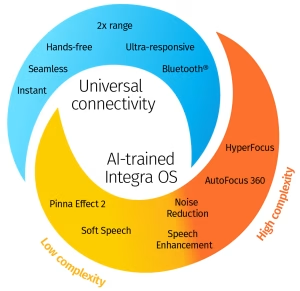

Anyone who has “encouraged” a loved one to see help for perceived hearing loss can tell you that it can be difficult to address this concern, much less get him or her to actually make an appointment. Then after the hearing test is done, and a diagnosis of a loss is made, some patients do not react well. Some come to the appointment accepting that they probably do have a loss and are ready to move forward. Others believe they may have a loss but are not ready to seek treatment. Still, others need time to accept that they have hearing loss at all.
There is another problem.
Also up to 24% of people who have hearing aids do not use them. The reasons behind these two problems vary. Some I mentioned above, people who do not really accept their hearing loss diagnosis. Others include self-reported activity restrictions, and lack of financial and social support. These can only be overcome through a patient-centered, holistic approach. Strategies such as patient education, counseling, and auditory training are helpful. Each person needs to understand their own motivations, understanding why it is important for them to seek help, is key to the successful management of their hearing healthcare. Ida Institute developed an online Telecare platform to help people living with hearing loss to better prepare for their appointments. One of the tools is “Why Improve My Hearing” (WIMH) which aims to promote readiness to address hearing loss and hearing aid self-efficacy (which is the belief in one’s capacity to succeed at tasks) before the first appointment.
All participants were adults with a good understanding of English who had not previously worn a hearing aid. Participants were assigned to one of two groups: the intervention group of 29 received the “why improve my hearing” tool plus standard clinical care, including hearing aids and the appropriate counseling; the control group of 28 received standard clinical care only. Patient-reported outcome measures were completed online before the initial appointment, immediately after that first appointment, and then 10 weeks post-hearing aid fitting.
The results were somewhat surprising.
You will recall that self-efficacy refers to one’s belief in one’s ability to complete a particular course of action or task. One possible reason is that all the study participants had the necessary skills and knowledge to use digital technologies; which was a prerequisite to taking part in the study. Other studies have shown that greater digital competency in first-time hearing aid users predicts superior practical hearing aid management skills.
Additionally, the researchers also measured patients’ readiness to manage hearing loss. They found that in the intervention group, patient readiness significantly improved from pre-assessment to both post-assessment and the 10-week follow-up. Both patients and audiologists reported that the Tool helped patients to take an active role in the decision-making processes during the appointment. In addition, patients reported that the Tool helped them to realize and accept before they came to the clinic that they had a hearing difficulty that might benefit from intervention.
This was the first study to assess the clinical effectiveness of an online telecare tool delivered prior to the initial hearing healthcare appointment; before hearing loss management decisions were made. The study did have its limitations, so more research is needed, but this study seems to be a promising first step to readiness.
Stay tuned, we hope to offer a readiness questionnaire for you as well. One good way is to take out a demo and see if you are truly ready. We will address a test drive demo process in another posting.
If you enjoyed reading our blogs, please comment or share a review. Thank you. Karen M. Edited by Kim F.
Powered By SinglerDesign.com